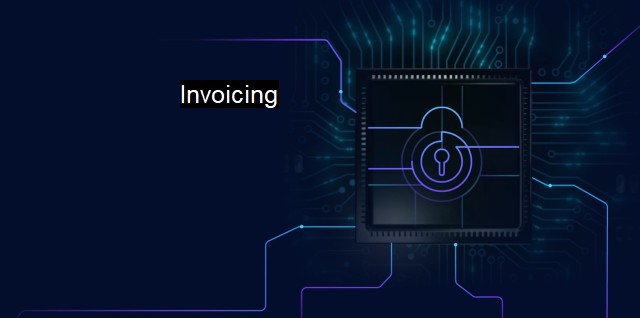What is Invoicing?
Securing Finances through Cybersecurity and Antivirus: The Importance of Invoicing in the Fight against Cybercrime
Invoicing can be defined as a process of sending bills or issuing documents to a buyer who must remit payment. These documents typically contain detailed information about the services provided or goods purchased. the invoice would detail the service type, quantity, amount to be paid, due date, terms of payment, among other important elements. In terms of the applicability of invoicing within the specific scope of cybersecurity and antivirus, a few contextual scenarios can be derived.Firstly, invoicing is fundamental in the transaction wherein a user procures a cybersecurity solution or an antivirus software from a software entity. When a purchase has been made, the subsequent step is commonly the issuance of an invoice, detailing the cybersecurity or antivirus solution purchased, alongside other crucial particulars. This serves as a testament to the exchange made between the buyer and the company, a tangible receipt if you will, asserting the transaction legality.
Conversely, invoicing is also leveraged by malignant entities in cyberspace. This practice is also known as invoice fraud. Cyber threat actors endeavor to exploit the aspect of trust that transpires naturally with invoicing. Cybercriminals accomplish this by masquerading as a reputable company and issuing false invoices to unsuspecting individuals or businesses, with the aim of extracting monetary gain. This official-looking invoice could include a link leading to a malicious website or a document infused with a virus. Upon opening the delivered invoice, online predators can surreptitiously run programs that purloin personal financial information or infest computers with various forms of malware.
With the growth of phishing scams using the invoice method, cybercriminals now have moved to software billings also. A customer gets a mail from a supposed cybersecurity software, quoting an invoice for an antivirus app they arguably subscribed to. The mail would instruct them to follow a link to cancel – triggering a malware download – or disregard and be charged. Delectably, malware will infiltrate the user’s system either way, and attackers get what they want.
In response, cybersecurity and antivirus providers have incorporated more secure methods of delivering their invoices. Many now deploy email encryption for their invoice-related correspondence. Alongside, these companies have heightened communication with their consumers, routinely warning against such scams and advising them to download services only from official and trustworthy sources.
Another paradigm of invoices in the cybersecurity scheme is the exploitation of enterprise resource planning (ERP) software. Businesses often use this type of software to manage their mundane activities such as invoicing. Conversely, threat operators recognized that they could use this as an access point, exploiting loopholes in the ERP with a specific aim to manipulate invoices or steal sensitive data. To achieve this, a cyber fraudster may attempt to change an invoice in a small but significant way, like adjusting a payment destination or amping up the total figure.
The aspect of invoicing plays a considerable role in the realm of cybersecurity. It acts as both a facilitating tool used by businesses for transactions related to the sale of cybersecurity and antivirus solutions, as well as a deadly weapon wielded by cybercriminals looking to defraud unsuspecting victims. Therefore, it is explicitly crucial to always remain vigilant of invoice-related fraud, double-check billing sources before acting, and purchase reliable antivirus software to safeguard against this form of cyberthreat.

Invoicing FAQs
What is the purpose of an invoice in the context of cybersecurity and antivirus?
An invoice in the context of cybersecurity and antivirus is a document that contains all the necessary details about the products or services provided to a client. It serves as a form of proof for the purchase and helps in tracking the transaction.Is it necessary to send an invoice for cybersecurity and antivirus services?
Yes, it is necessary to send an invoice for cybersecurity and antivirus services. Invoices help in maintaining a record of all the transactions and provide proof of the services provided. It also helps in ensuring that all parties are clear on the terms and conditions of the transaction.What information should be included in an invoice for cybersecurity and antivirus services?
An invoice for cybersecurity and antivirus services should include the details of the products or services provided, the date of the transaction, the amount, and any additional charges. It should also contain the name and contact information of the service provider and client, as well as any payment terms and deadlines.How can invoicing be made more secure in the context of cybersecurity and antivirus?
Invoicing can be made more secure in the context of cybersecurity and antivirus by using encryption, secure online payment gateways, and digital signatures. It is also important to ensure that the invoice is sent to the correct email address and that both parties have verified each other's identities before the transaction. Regularly monitoring and updating the invoicing system can also help in detecting any potential security breaches.| | A | | | B | | | C | | | D | | | E | | | F | | | G | | | H | | | I | | | J | | | K | | | L | | | M | |
| | N | | | O | | | P | | | Q | | | R | | | S | | | T | | | U | | | V | | | W | | | X | | | Y | | | Z | |
| | 1 | | | 2 | | | 3 | | | 4 | | | 7 | | | 8 | | |||||||